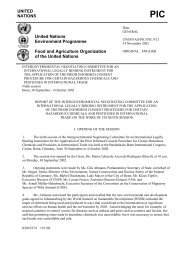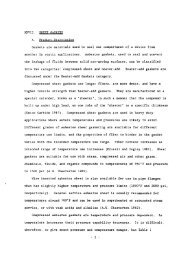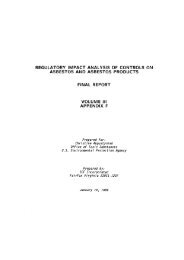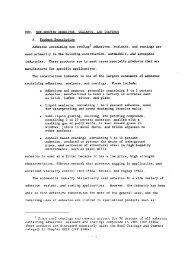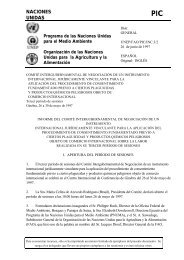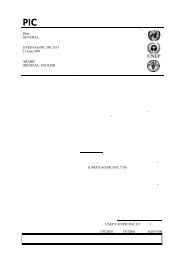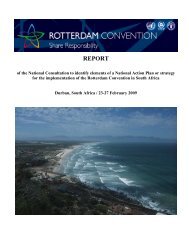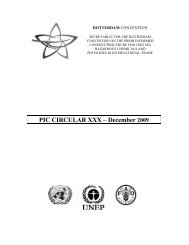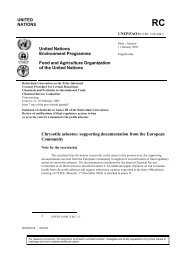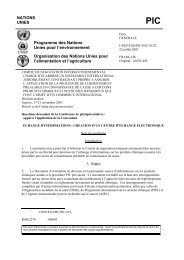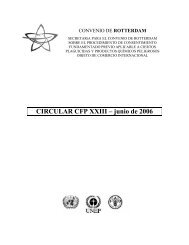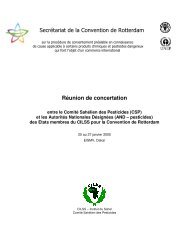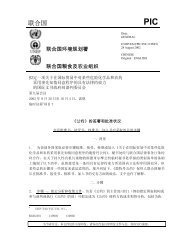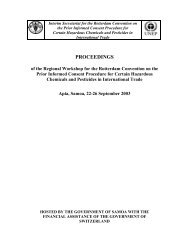Rep o rt of th e tw en - Rotterdam Convention
Rep o rt of th e tw en - Rotterdam Convention
Rep o rt of th e tw en - Rotterdam Convention
Create successful ePaper yourself
Turn your PDF publications into a flip-book with our unique Google optimized e-Paper software.
Japan:<br />
i. Prohibited <strong>th</strong>e impo<strong>rt</strong> <strong>of</strong> host plants grown in countries/regions where sixte<strong>en</strong> species<br />
<strong>of</strong> significant pests (e.g. Mediterranean fruit fly, etc.) were pres<strong>en</strong>t.<br />
ii. Also requested growing site inspection in expo<strong>rt</strong>ing countries in <strong>th</strong>e case <strong>of</strong> <strong>th</strong>e impo<strong>rt</strong><br />
<strong>of</strong> <strong>th</strong>e host plants grown in countries/regions where t<strong>en</strong> species <strong>of</strong> significant pests<br />
(e.g. sugar beet nematode, etc.) were pres<strong>en</strong>t.<br />
iii. Added 46 species <strong>of</strong> pests (e.g. onion <strong>th</strong>rips and <strong>tw</strong>o spotted spider mites, etc.) to<br />
non-quarantine pests last April. At pres<strong>en</strong>t <strong>th</strong>e number <strong>of</strong> non-quarantine pests is<br />
109 species.<br />
Agricultural pesticides could not be manufactured, impo<strong>rt</strong>ed, distributed and used wi<strong>th</strong>out<br />
<strong>th</strong>e registration granted by <strong>th</strong>e Minister <strong>of</strong> Agriculture, Forestry and Fisheries under <strong>th</strong>e Agricultural<br />
Chemicals Regulation Law in Japan. The inspection on human heal<strong>th</strong> and <strong>en</strong>vironm<strong>en</strong>tal effect,<br />
etc., for <strong>th</strong>e registration was conducted by <strong>th</strong>e Agricultural Chemicals Inspection Station (Incorporated<br />
Administrative Ag<strong>en</strong>cy).<br />
Training courses on <strong>th</strong>e disinfestation technique <strong>of</strong> fruit fly were held since 1988, for plant<br />
quarantine expe<strong>rt</strong>s <strong>of</strong> developing countries where fruit flies are pres<strong>en</strong>t, in order to provide <strong>th</strong>em<br />
up-to-date techniques. By 2004, 85 trainees from 31 countries pa<strong>rt</strong>icipated in <strong>th</strong>is training course.<br />
This year five trainees from five countries pa<strong>rt</strong>icipated.<br />
3.22 Pacific Plant Protection Organization (PPPO)<br />
The PPPO repo<strong>rt</strong>ed <strong>th</strong>e unde<strong>rt</strong>aking <strong>of</strong> <strong>tw</strong>o major projects. They were biosecurity, and trade<br />
suppo<strong>rt</strong> and plant heal<strong>th</strong> suppo<strong>rt</strong>. There was one rec<strong>en</strong>t major achievem<strong>en</strong>t, which was <strong>th</strong>e availability<br />
<strong>of</strong> <strong>th</strong>e online Pacific Islands Pest list database PLD launched and <strong>of</strong>ficiated on 24 May 2005.<br />
3.23 <strong>Rep</strong>o<strong>rt</strong> from CropLife Asia<br />
CropLife Asia was introduced as a regional node for CropLife International, which provided<br />
training on <strong>th</strong>e safe use <strong>of</strong> products for IPM. The major emphasis was to continually improve training<br />
<strong>of</strong> farmers. CropLife Asia hoped to create a bigger impression at <strong>th</strong>e next APPPC meeting upon<br />
fu<strong>rt</strong>her implem<strong>en</strong>tation <strong>of</strong> its programmes. Delegates could log on to www.croplifeasia.org to find<br />
out more.<br />
3.24 International Rubber Research and Developm<strong>en</strong>t Board (IRRDB)<br />
The IRRDB, established in 1960, was a research and developm<strong>en</strong>t ne<strong>tw</strong>ork which brought<br />
toge<strong>th</strong>er <strong>th</strong>e natural rubber research institutes in vi<strong>rt</strong>ually all <strong>th</strong>e natural rubber producing countries.<br />
Curr<strong>en</strong>t emphasis included research on SALB in Brazil, and had <strong>of</strong>fered fellowships in its programmes.<br />
So far, <strong>th</strong>e Association <strong>of</strong> Rubber Producing Countries had organized <strong>th</strong>ree workshops in Brazil,<br />
which had led to <strong>th</strong>e str<strong>en</strong>g<strong>th</strong><strong>en</strong>ing <strong>of</strong> effo<strong>rt</strong>s in SALB research and <strong>th</strong>e highlighting <strong>of</strong> <strong>th</strong>e role <strong>of</strong><br />
Plant Quarantine Officers in <strong>th</strong>e rubber industry. In May 2004, <strong>th</strong>e IRRDB wi<strong>th</strong> <strong>th</strong>e cooperation <strong>of</strong><br />
Michellin and CIRAD (Fr<strong>en</strong>ch Agricultural Research C<strong>en</strong>tre for International Developm<strong>en</strong>t), organized<br />
a SALB workshop.<br />
25



